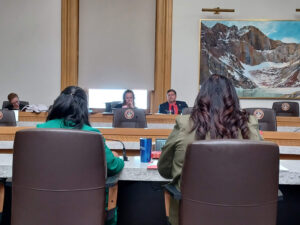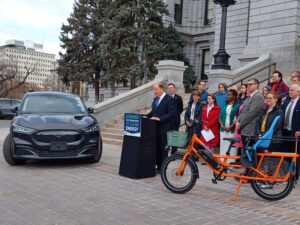In both 2021 and 2022, public backlash quashed attempts by Colorado officials first to mandate that large employers reduce their workers’ single-occupancy-vehicle trips and then to offer incentives to companies to get employees’ cars off the road. Yet, the idea hasn’t died.
If Monday’s Transportation Legislation Review Committee is to be taken as an indication of the state of the proposal, though, it likely isn’t coming back anytime soon. Committee members heard a presentation on a voluntary employee-commuting program in the Denver area and a mandatory program in Washington but decided not to consider a potential bill on the topic — after members didn’t ask questions to the organizations sponsoring the described programs.
That doesn’t mean an individual member of the TLRC — or a legislator who doesn’t sit on the committee combining the House and Senate transportation panels, for that matter — won’t run a bill mandating or incentivizing employers to work to get employees onto transit or bikes. But because legislators are limited to five bill titles (a cap against which interim committee bills don’t count) and because committee bills tend to carry more weight, the chances of a new battle arising over an employee trip-reduction program in 2024 at least appear to be reduced.
History of employee trip reduction proposals
Before the meeting Monday, it appeared that the subject was going to be ripe for discussion again, even if past discussions had seemed to produce a sense that this was not an area where state leaders felt particularly comfortable inserting the government.
Gov. Jared Polis’ administration in July 2021 halted a plan to have the Colorado Air Quality Control Commission consider either mandatory or voluntary cutbacks to employee car trips by businesses with 100 or more workers onsite after business groups led an uproar against it. And when then-Rep. Matt Gray of Broomfield sought to create an incentive program for employers to cut down on commutes in 2022, it died by a 9-1 vote in committee, with business groups warning it would lay the groundwork for a future mandate and legislators questioning the benefits of such a plan.

Colorado state Rep. Alex Valdez listens as Reps. Jennifer Bacon and Jenny Willford present their air-quality permitting bill to a House committee in April.
The idea reared its head again during the 2023 legislative session when an air-quality-permitting reform bill included a provision to require development of vehicle-miles-traveled limits for workers as part of a slew of new regulations. However, sponsors yanked that and a host of other proposed standards out of House Bill 1294 during its initial committee hearing.
How other programs work
On Monday, Ricardo Gotla, who oversees transportation-demand-management programs for the Washington State Department of Transportation, told TLRC members that his state’s Commute Trip Reduction program has cut 450 metric tons of greenhouse gas emissions annually. It’s also cut fuel consumption by 50 million gallons per year and eliminated 4% of all single-occupancy vehicle trips, which he called a “narrow but very important trip market.”
Under the Washington law, employers with 100 or more employees at one site must survey workers on commute patterns and work to offer them solutions that promote more usage of transit, micro-transit, biking, walking and telework. The program applies only in the more congested parts of the state, such as the Seattle metro area, and it focuses particularly on morning commutes involving some 550,000 commuters.
For a different solution to the problem of transportation-sector-based emissions, the Denver Regional Council of Governments explained its Way to Go program, which seeks out large employers along transit lines and discusses commuting reductions they can make. The program, which is purely voluntary, conducts employee surveys and assesses respondents’ attitudes to see what options may be possible in terms of transit passes, carpooling or even increased remote work, explained Nisha Mokshagundam, program manager.

Multimodal advocates have said that e-bikes, such as this one shown beside Gov. Jared Polis during a March news conference on green-energy bills, are a way to get more commuters out of single-occupancy vehicles.
Why business leaders oppose employee trip reduction plans
Business leaders offered a litany of reasons that they did not like the idea of any state-run employee trip reduction program during the 2022 hearing over Gray’s bill, according to a story I wrote then for the Denver Business Journal.
Construction workers would be disadvantaged if they had to haul heavy equipment on transit or an Uber, said Michael Gifford, president/CEO of the Associated General Contractors of Colorado. And any state tracking of employee trips — whether to their homes or to other starting or ending points — could be a violation of privacy and seemed to foretell future requirements for workers to give up car trips, according to groups ranging from the Colorado Chamber of Commerce to the Colorado Automobile Dealers Association.
“Employers can play a role in encouraging and assisting employees in making commuting decisions, but it isn’t appropriate that they insert themselves into those personal decisions,” said Rachel Beck, the current Colorado Competitive Council executive director who then was Colorado Springs Chamber and Economic Development Corp. vice president of public affairs.
Pleas from transportation-management community
Michael Hughes, executive director of the West Corridor Transit Management Association, argued on Monday, however, that privacy concerns in 2022 were unfounded and featured “ridiculous examples” of how the state could track worker travel. He also argued that concerns about increasing employer expenses were more acute coming so close to the coronavirus pandemic and that setting up carpooling systems or buying bus passes would cost little.
“Saving people time in their commute is an economic benefit, not an economic cost,” Hughes told the TLRC. “Severe nonattainment for ozone, if it persists, will be an economic downturn for the economy.”
Instead of asking legislative staffers to draft any bills involving employee trip reduction programs, the committee will study 10 potential pieces of legislation concerning transportation safety, public-transit operations and regulation of the non-consensual towing industry. Among the bills it will vote on whether to advance on Oct. 3 are proposals to create a statewide transit pass that works across various agencies, to require higher levels of insurance for rail cars carrying hazardous materials and to boost drivers’ education requirements.
Committee members also voted down or failed to advance several proposed bills, though individual members are still free to introduce those bills. Those included an idea from Sen. Byron Pelton, R-Sterling, to limit property tax assessments to land not in a public right of way and proposals from Rep. Ruby Dickson, D-Greenwood Village, to scale traffic fines based on violators’ income levels and to abolish commercial parking minimum requirements for bars and marijuana businesses in order to encourage customers to use transit.
